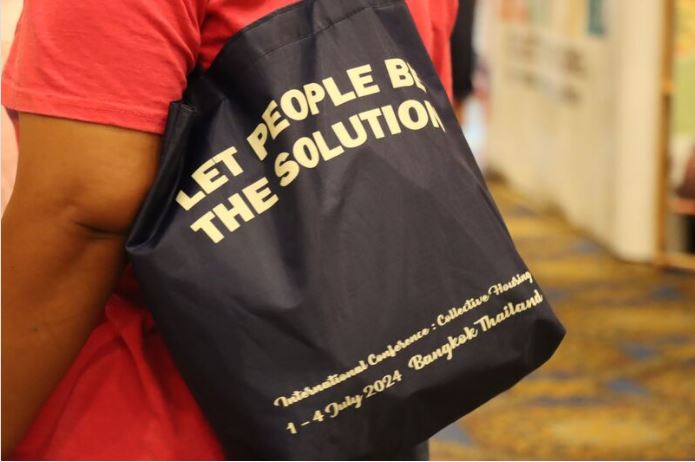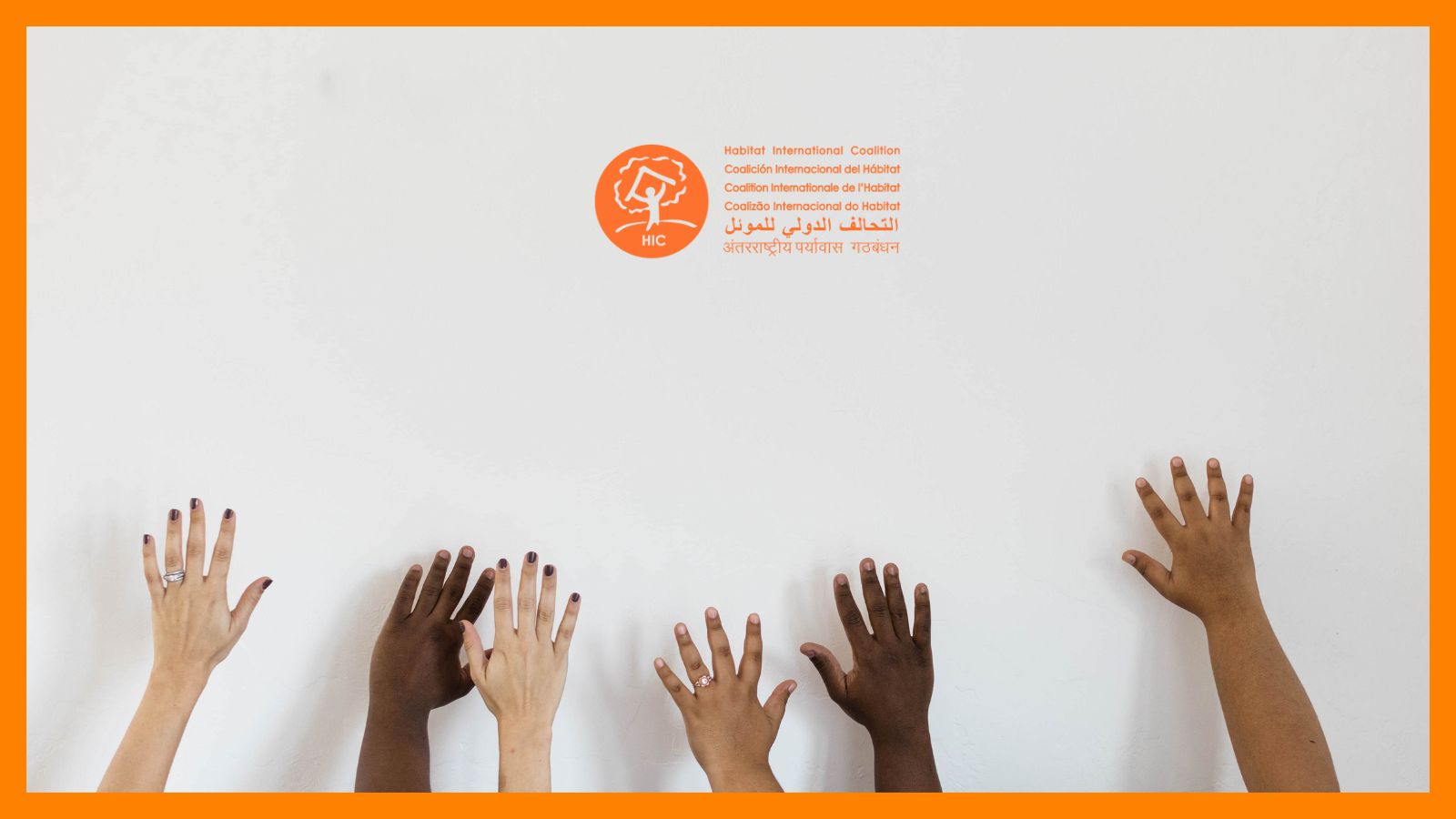By Adriana Allen, HIC President, 6 October 2023
On 19-20 September 2023, the United Nations held the SDG Summit in New York which “marked the beginning of a new phase of accelerated progress towards the Sustainable Development Goals with high-level political guidance on transformative and accelerated actions leading up to 2030.” The outcome of the SDG Summit was a Political Declaration that reaffirms the 2030 Agenda, while recognising that the SDGs are in peril and commits Member States to “bold, ambitious, accelerated, just and transformative actions, anchored in international solidarity and effective cooperation.”
HIC’s objectives and participation
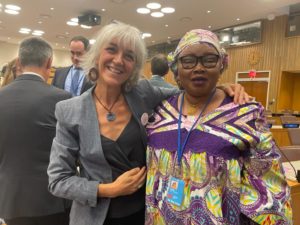 As shared prior to the SDG Summit, HIC was present to call on Member States and UN agencies to commit to concrete actions guided by a human rights-based approach and through the inclusion of civil society and local government actors and to engage with locally-led initiatives such as the social and solidarity economy, the right to the city, the social production of habitat and the collective defence and protection of commons. Our Declaration was jointly produced with the Global Platform for the Right to the City, calling for “effective recognition and inclusion of civil society and local government actors in the discussion as well as direct support to the transformative initiatives being led by them.”
As shared prior to the SDG Summit, HIC was present to call on Member States and UN agencies to commit to concrete actions guided by a human rights-based approach and through the inclusion of civil society and local government actors and to engage with locally-led initiatives such as the social and solidarity economy, the right to the city, the social production of habitat and the collective defence and protection of commons. Our Declaration was jointly produced with the Global Platform for the Right to the City, calling for “effective recognition and inclusion of civil society and local government actors in the discussion as well as direct support to the transformative initiatives being led by them.”
In New York, Lorena and I joined forces to mobilise support towards our collective Declaration, while working hand in hand with United Cities and Local Governments (UCLG) and the Huairou Commission, among other HIC allies. Towards this aim, I attended two fora that took place before and in parallel to the 2023 SDG Summit:
(1) The SDG Action Weekend convened by the UN Secretary General to maximise the impact of the SDG Summit and offer a space for Local and Regional Governments and organised civil society to be heard,
(2) the Global People’s Assembly (GPA) convened by Global Call to Action Against Poverty and co-organized by over 50 civil society groups, as a platform to raise the voice of the people, while government leaders met at the UN Headquarters in New York. Even though HIC holds special consultative status with UN ECOSOC, participation in the SDG Summit was highly restricted for civil society.
Core debates
A cross-reading of the core debates that took place at the SDG Summit reveals broad-brush consensus on three areas:
- The urgent need for a new form of multilateralism
- Reframing action and commitments from a feminist perspective that advocates BOTH for gender equality and equality in diversity
- Bold and urgent responses to the climate crisis, also integrated across all SDGs and with a clear rights-based approach.
Conspicuous silence prevails in relation to housing rights and the hyper-financialisation of housing and land, with a siloing approach still prevailing in relation to other key human rights related to habitat such as access to and control over food, water and sanitation, and energy.
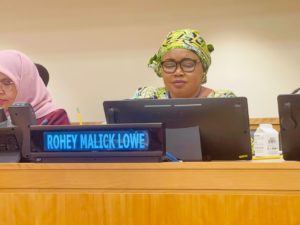 Key challenges ahead of us:
Key challenges ahead of us:
Democratising UN governance and SDG international finance architecture
Many organisations are with HIC in highlighting the urgent need for change and effective strategies at the halfway point of the 2030 Agenda. This includes the need to significantly advance the quality of institutionalised spaces meaningful and resourced participation of civil society organisations (CSOs) in SDG implementation, monitoring and evaluation.
For a comprehensive assessment of the inclusion of CSOs in the Voluntary National Review (VNR) processes, as well as the institutional conditions of national SDG implementation, see the latest report by the CSO Partnership for Development Effectiveness (CPDE). The report reveals that 84% of 64 countries included in the study, only 25% have been reported by CSOs as representative of them. This means that decisions on how to implement the SDGs, from financing to monitoring, are made without proper consultation with and feedback from civil society and marginalised groups.
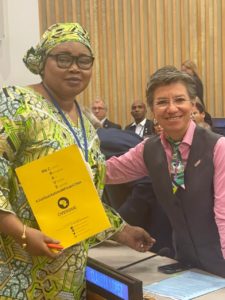 Transcending the siloing effect
Transcending the siloing effect
What was seen through the formulation and implementation of the Millenium Development Goals (MDGs) is arguably being repeated in the Sustainable Development Goals (SDGs). Despite the inclusion of a goal dedicated to “make cities and human settlements inclusive, safe, resilient and sustainable” (SDG11), habitat-related rights are still siloed and approached without tackling the underlying processes and drivers of the commodification and hyper-financialisation of critical lifelines such as land, housing, food, energy, mobility and water and sanitation. For example, in the case of food, the SDGs frame food security around the issue of production and availability, paying significantly less attention to the questions of food accessibility and sovereignty. A similar trend can be observed in relation to housing, land, and sanitation, among other basic services. The Political Declaration adopted after the SDG Summit refers to the commitment “to promote access for all to adequate, safe and affordable housing” under article 38(h), while failing to advance specific commitments to protect the right to the city, to land and to sanitation, and in doing so, sidelining again some of the most progressive objectives of the New Urban Agenda.
Localisation AND democratisation
The aim of the SDG Summit was to make substantial progress to accelerate the realisation of all SDGs by 2030. Given that in many vital areas, including reducing inequality, lowering carbon emissions and tackling hunger, progress since 2015 has either stalled or reversed, it is clear that the SDGs do not just require acceleration but a rescue plan. Such a plan cannot move forward without the bold pursuit of a rights-based approach, the articulation of a feminist perspective beyond tokenism and the recognition of the vital role that local communities already play in commoning and protecting the social and ecological functions of human settlements. In short, localisation understood as ‘local implementation’ is not enough, we need to continue struggling for a profound democratisation of the 2030 Agenda and the revitalisation of the New Urban Agenda, understanding that citizen participation is not only the exercise of a political right but also the opportunity for policies to be more legitimate, more inclusive, and more transformative. As highlighted by UN Secretary General Antonio Gutierrez in his closing remarks at the SDG Action Weekend, Member States won’t make real progress towards the realisation of the SDGs, unless they are urged to do so by civil society. After the SDG Summit he took a bold step towards strengthening multilateralism with the launch of an Advisory Group engaging local and regional governments in making substantial progress towards the 2024 Summit of the Future. This is a big triumph for UCLG, a key HIC ally, and is a call to strengthen our efforts to get civil society a seat at the table: Nothing about Us, without Us!
